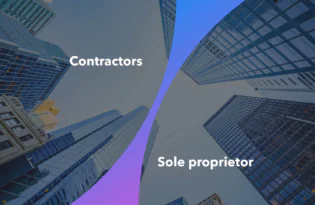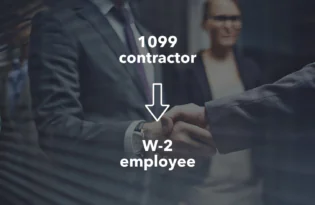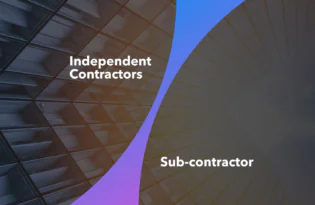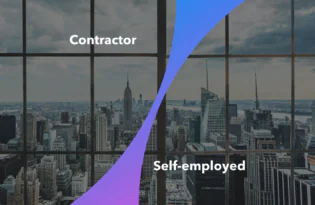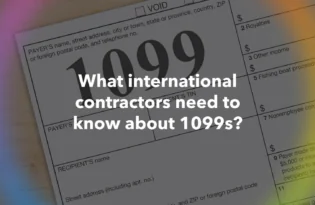Efficient ways to pay international contractors
Business owners need solutions to pay international contractors, but the reality is that not all solutions are created equal.

Making sure you can seamlessly pay international contractors is an essential part of growing your business because it allows you to source some of the best talent for a given job regardless of that specialist’s location.
To help you get started, review the table below to consider your main options for paying international contractors and what kind of business is best suited to each one.
Some of the best ways to pay international contractors
| Method | Pros | Cons | Best For |
|---|---|---|---|
| Payment Platforms | Competitive Fees, Multi-currency support, Contractor management tools | Monthly subscription costs | Business owners who make frequent international payments |
| Freelancer Platforms | Easy to use, Integrated project management tools, Built-in escrow for security | High platform fees require contractors to have an account | Contractors already working within the platform’s ecosystem |
| EOR/AOR Services | Compliance, Typically includes tax & payroll support | Platform limitations | Long-term contractors in need of recurring payments and ongoing tax/compliance needs |
| Digital Wallets | Easy to use/setup, Faster payments | Multiple fees, Not universally accepted | Businesses with rare cross-border payments |
| Bank Transfers | Stand alone, Easy to use | High cross-border fees, Rarely provides multi-currency support | Contractors with compatible banking systems |
| Wire Transfers | Tight security, Large payment amounts | Higher fees, Slow speed, Not built for recurring payments | Large one-time payments |
What to look for when paying international contractors
Although the table above details the major categories by which business owners pay international contractors, the nuances of each one will vary depending on the individual provider.
The sections below detail the most important features of paying international contractors, as well as how business owners can evaluate prospective providers when making their decision.
1. Multi-Currency Support
A robust multi-currency account allows business owners to pay international contractors quickly and easily across different currencies without having to manage multiple bank accounts.
In addition, they can avoid expensive exchange fees because they can pay contractors in the desired currency from their account (assuming they have available funds).
The more currencies a platform offers, the greater its global reach.
The table below describes the qualities at different levels of multi-currency support in greater detail.
| Poor | Fair | Good | Better | Best |
|---|---|---|---|---|
| No multi-currency support | Limited (1-3) currencies supported | 5-10 common currencies, but no regional options | 30+ common currencies | 50+ currencies |
Payoneer Workforce Management, for instance, supports contractor payments in 70 currencies.
2. International Invoicing Options
International contractors often prefer to use invoicing due to the compliance and tax measures it provides.
In addition, it can often help streamline the payment process.
For business owners, it’s a great way to pay international contractors while also giving them the peace of mind that comes with a written agreement for their labor.
The exact solutions available to business owners vary depending on what kind of platform they work with. When evaluating the invoicing options available to you, consider the following scale:
| Poor | Fair | Good | Better | Best |
|---|---|---|---|---|
| No invoicing available | Provides templates for invoicing, but no automation | Basic invoicing with limited customization and tracking | Works in tandem with multi-currency support and tax calculations | Automated invoicing for recurring payments with customization options |
Similar to multi-currency options, invoicing is a valuable enough service that providers typically have a page dedicated to its description.
3. Global Reach
Business owners who want to source the best talent require a solution that can manage global transactions and has a customer support team that works directly with contractors in the appropriate language.
Access to this level of support allows business owners to truly collaborate with international contractors while also ensuring a positive working relationship.
| Poor | Fair | Good | Better | Best |
|---|---|---|---|---|
| Limited (USD and EUR) to no support for global contractors | Available in 5-50 countries with limited currency/ language support | 50+ countries 10+ languages | 100+ countries 15+ languages | 150+ countries 20+ languages |
4. Faster Payment Times
Paying international contractors efficiently requires promptness. This not only ensures a regular payment cadence but also enables businesses to handle adjustments quickly in the event of overlooked or non-recurring payments.
On average, the experience of paying international contractors typically falls somewhere on the scale below.
| Poor | Fair | Good | Better | Best |
|---|---|---|---|---|
| 5+ business days | 3-5 business days | 2-3 business days | Same-day payments | Near real-time payments |
Payment speed is often buried in the FAQs of many international payment providers due to the difficulty in providing an answer to the question.
The reality of international payments is that, unless you have a direct payment portal, the actual speed will vary depending on the international clearinghouse, as well as the international and local banks.
Unless they provide this portal themselves, providers can typically only provide you with an average based on how long their existing payments take. For the best results, seek out options that provide a dedicated portal.
5. Low Fees
Paying international contractors typically incurs a great number of fees:
- Payment Processing
- Currency Conversion
- Bank Transfer
- Withdrawal
- Cross-Border/International
- Compliance
- Intermediary Banks
In addition to all of those above, many services now employ a subscription model to generate revenue. That’s why finding an international payment provider that provides transparency into their fee structure is critical.
The details will vary by individual provider, but the scale below breaks down some of the most common fees.
| Poor | Fair | Good | Better | Best |
|---|---|---|---|---|
| High rates, Hidden charges, Multiple fees per payment | Moderate rates, Limited transparency, Additional multi-currency or international fees | Moderate rates, Provides fee information, but materials do not target average readers, Competitive multi-currency rates | Minimal rates, Transparent pricing information is provided, Low currency conversion | Negligible fees, including invoice payments, Real-time currency conversions at mid-market rates, No hidden charges |
Because the question of fees is so common, we highly recommend avoiding payment solutions that do not have a dedicated page explaining their fees.
Furthermore, the page should clearly explain where these fees apply in the transaction process, as some platforms include fees at multiple stages of the transaction, adding up to more than is initially advertised.
The best solution to pay international contractors easily and quickly?
Finding an all-in-one solution for international payments allows you to customize your service to your needs and grow your business as needed. Most often, this means working with a global contractor management platform like Payoneer Workforce Management.
Our solutions are customizable and provide users with a better degree of integration options for business owners and freelancers who want a platform that offers payments as a comprehensive solution.
Contact us for more information.
FAQs
1. How do I pay an international contractor?
You can pay an international contractor using methods like wire transfers, payment platforms, or contractor management systems such as Payoneer Workforce Management. It’s important to choose a secure, cost-effective option that also offers support for compliance with local laws.
2. Do I need to issue a 1099 to a foreign contractor?
No, you usually do not need to issue a 1099 to a foreign contractor. However, you should collect a completed Form W-8BEN from the contractor to document their foreign status for IRS records.
3. Can a US company hire an international contractor?
Yes, a US company can hire international contractors. You don’t need to set up a local entity, but you must follow local labor laws, manage taxes correctly, and use proper contracts to avoid misclassification.
Related resources
Latest articles
-
Employment laws in Sweden
Explore the employment laws in Sweden, a comprehensive guide to employees’ rights, employer obligations, and fair labor practices.
-
Employment laws in Poland
Explore the ins and outs of employment laws in Poland, an info-rich guide to employees’ rights, employer obligations, and fair labor practices that shape the future.
-
Employment laws in Indonesia
Find out more about Indonesia labor laws that dictate how employees should be contracted, managed, and paid, both on a national and state/territory level.
-
Employment laws in France
Learn about France’s labor laws dictating minimum wage, benefits, and more. Plus, discover the consequences of non-compliance with employment laws in France.
-
Employment laws in Spain
Find out more about Spain’s labor laws, from contracts and benefits to termination rules.
-
Employment laws in Australia
Find out more about the employment laws in Australia that dictate how employees should be contracted, managed, and paid, both on a national and state/territory level.
Disclaimer
The information in this article/on this page is intended for marketing and informational purposes only and does not constitute legal, financial, tax, or professional advice in any context. Payoneer and Payoneer Workforce Management are not liable for the accuracy, completeness or reliability of the information provided herein. Any opinions expressed are those of the individual author and may not reflect the views of Payoneer or Payoneer Workforce Management. All representations and warranties regarding the information presented are disclaimed. The information in this article/on this page reflects the details available at the time of publication. For the most up-to-date information, please consult a Payoneer and/or Payoneer Workforce Management representative or account executive.
Availability of cards and other products is subject to customer’s eligibility. Not all products are available in all jurisdictions in the same manner. Nothing herein should be understood as solicitation outside the jurisdiction where Payoneer Inc. or its affiliates is licensed to engage in payment services, unless permitted by applicable laws. Depending on or your eligibility, you may be offered the Corporate Purchasing Mastercard, issued by First Century Bank, N.A., under a license by Mastercard® and provided to you by Payoneer Inc., or the Payoneer Business Premium Debit Mastercard®, issued and provided from Ireland by Payoneer Europe Limited under a license by Mastercard®.
Skuad Pte Limited (a Payoneer group company) and its affiliates & subsidiaries provide EoR, AoR, and contractor management services.

